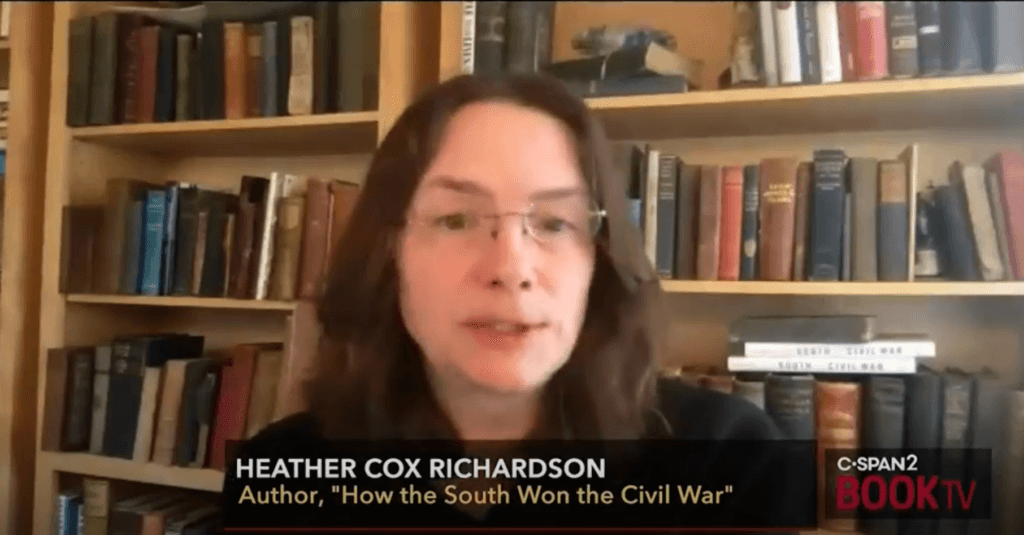Heather Cox Richardson, a history prof at Boston College, is a star commenter these days (heralded by the NYT and my wife who listens to her podcast); and CSPAN aired an appearance Richardson made last May about her Civil War book in which she discussed conspiracy theories and the neocons who got us into the Iraq War. Long excerpt:
I am not a conspiracy person, I’m a very kind of Let’s just keep asking questions till we get to the basic things. One of the things that’s astonished me, is If you want to understand conspiracies and you want to understand how things really work, they’re everywhere around you. If you really want to get into something, go ahead and look at the history of the Post Office, which is this entangled complicated fascinating human story. Why are you manufacturing something when there’s so much real stuff that is so fascinating.
I was talking about this yesterday about the leadup to the Iraq war and the group of neocons who organized the Project for the New American Century and I remember hearing about that in the 1990s and thinking, Oh that’s tin foil hat stuff. It’s on the internet, signed by them, by Bill Kristol and Donald Rumsfeld and all the people who went on to get us involved in the war in Iraq and I thought why on earth are people inventing conspiracy theories about what happened when you literally can sit there and say Here’s a group of people who launched this argument that after the Cold War, America needed to reassert its world power and it needed to do so beginning in Iraq.
Then I also heard about Donald Rumsfeld after 9/11 saying, Did we get enough to hit Saddam Hussein? And me thinking Oh that’s a conspiracy theory, he couldn’t possibly have said that. And then of course once I did the research, he did, he absolutely said it, it’s never contested, it’s everywhere when you look.
So I just wonder about conspiracy theorists because if you want to really get involved in stuff and look at the levers of power and look at how things change, it’s all right there. You don’t have to invent something happening in the basement of a pizza parlor. Or the idea that somehow somebody planted a birth certificate in Hawaii or that Anthony Fauci had started something back in AIDS that has now been uncovered by a failed medical researcher. There’s plenty that’s right there that you can actually get into…
I think it’s also partly a sign of people feeling unempowered. They want to say that they know more than the experts that somehow the experts are cheating and they somehow know more than the experts just by their own gut sense. And that’s deeply problematic. Because experts are fairly prickly… Some of them can be difficult. But I don’t think I’ve met a real expert who wasn’t deeply in love with their topic and in love with the truth.
My own comment is, this is very smart, and the neocons were obviously a conspiracy in plain sight to start the war. It’s interesting though that there’s a limit to the discussion. You can only ask so many “questions to get to the basic things.” The idea that Israel played a prominent part in the neocons’ thinking isn’t addressed. Israel’s war against Palestinians is our war was a theme of those PNAC letters, and using US military power in Israel’s interests is a theme of neocon thought going back to Irving Kristol in the 70s. But Richardson boils the neocon argument down to reasserting US military strength post Cold War.
John Mearsheimer and Stephen Walt were impolitic enough to say in 2006 that the Israel lobby played a crucial role in pushing the Iraq war, and they were largely dismissed by the Jeffrey Goldbergs of the establishment, who had helped start the war, as antisemitic conspiracy theorists. It’s astonishing to me that 15 years after Walt and Mearsheimer published their bombshell Israel lobby paper, it’s alright to talk about the Israel lobby’s effect on US policy re Israeli settlements but not about its effect on US military engagement in the Middle East.
When actually Donald Trump said during the campaign that the reason the U.S. has troops in the Middle East is to “protect Israel.”
The fact is, we don’t have to be in the Middle East, other than we want to protect Israel. We’ve been very good to Israel. Other than that, we don’t have to be in the Middle East.
Years ago a knowledgeable editor friend explained to me that Hillary Clinton “had to support” the Iraq war in 2002. While Jerry Nadler bravely opposed that war and was attacked for abandoning Israel. These politics go well beyond the PNAC and have never been explained to us sufficiently, and they’re what Barack Obama went up against in inside his own party in getting the Iran deal. When Richardson exalts “experts”, she makes clear she means academic experts who get paid $40,000 a year. But the experts who have created opacity about the war in Iraq are actually policymakers, journalists and think tank intellectuals who supported that war and don’t want an open investigation of its causes.
And the push for U.S. military adventures on behalf of Israel never ends. Speaking of conspiracies, the Iranian foreign minister Javad Zarif tweeted today about Israeli belligerence in the region:
New intelligence from Iraq indicate that Israeli agent-provocateurs are plotting attacks against Americans—putting an outgoing Trump in a bind with a fake casus belli. Be careful of a trap, @realDonaldTrump. Any fireworks will backfire badly, particularly against your same BFFs.
James North writes, “foreign minister rightly warns that #Israel could be trying to provoke the U.S. into war with his country. #Netanyahu has attempted to instigate conflict for a decade. Why is the mainstream U.S. media missing this angle?” Good question.



She is partly right. Much of the most outrageous stuff is hidden in plain sight. But if the mainstream press doesn’t talk about it, it becomes a conspiracy theory.
The only important thing is whether there is evidence to support a given assertion— slapping the phrase “ conspiracy theory” on something tells me nothing. Also, it is difficult for the average person or for anyone to investigate all the different assertions people make and yet we know the msm often distorts the news or simply passes on lies. So calling something a CT is sometimes just a way to avoid thinking. Some conspiracy theories really are nonsensical, but some aren’t and some are even true.
Israel apologists denied the Nakba for decades and invented their own conspiracy theory which was that the Palestinians fled at the behest of their leaders. This was a conspiracy to cover up the truth. So in the case of the Nakba, you had a choice of two conspiracy theories, one true ( the Palestinians were forced out and Western society lied about it) and one false ( the Palestinians fled because of their leaders).
Thanks for this thoughtful, factual, and logical analysis of this VERY important issue. The slow pace at which this issue is entering the mainstream discussion testifies to the powerful and relentless efforts being made to maintain the silence. Here’s an excellent discussion of the problem of suppressed information and disinformation that we are confronting. Julian Assange provides facts and context which make him so feared by the silencers.
<i>”Watch: Assange & Pilger in Debate on ‘Propaganda, Facts and Fake News,’ Dec. 2, 2017″</i>
https://consortiumnews.com/2021/01/01/watch-assange-pilger-in-debate-on-propaganda-facts-and-fake-news-dec-2-2017/
In science, a bigger gap in available evidence enables more theories to potentially fill that gap. The same is undoubtedly true in politics. We know conspiracies have existed since the ancient Roman Empire and before. The recent perjorative use of the term “conspiracy theory” has been used uniformly in the corporate press to silence discussion of these and related issues. In that regard it is similar to the frequent use of the term “anti-Semitism” to silence discussion of Israel’s crimes. As Assange reports, Thomas Jefferson remarked on this same problem of media manipulation. And long before Jefferson, Sun Tzu wrote in “The Art of War” about the key role of controlling information.
This is why the 1st Amendment to the US Constitution is such an important step forward for humanity. It guarantees, at a minimum, open political and religious discussion. It defangs one of the most crucial tools of tyranny. Anybody who truly values the truth should want all the facts on the table. Anyone working to suppress facts and silence discussion clearly cannot be trusted. They probably have a hidden agenda to benefit themselves and endanger others. I’d also guess they quite probably belong in prison.
2 of 2
“The Democratic Party’s relationship with Israel is undergoing a seismic shift. The once-impenetrable unity on nearly unconditional support for Israel has given way to progressives elected in recent years who are willing to call the Jewish state to account for human rights violations. That shift was a belated expression of a long-held sentiment among the party’s progressive base: that as the U.S. reevaluates alliances with countries that abuse human rights, Israel should not be an exception.”